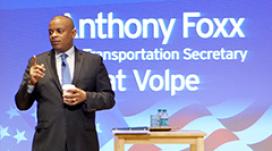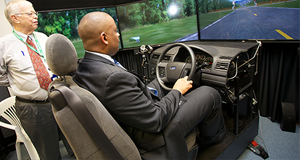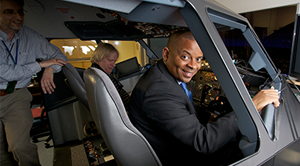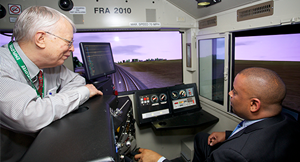DOT Secretary Anthony Foxx Talks America’s Transportation Future at Volpe
Transportation is dynamic. Whether we’re thinking about how we use transportation in our daily lives or how transportation keeps our economy moving, our options for mobility affect where we live, where we work, and the ladders of economic opportunity available to us.
That’s the message U.S. Secretary of Transportation Anthony Foxx brought when he joined the Volpe community on July 20 for a wide-ranging town hall discussion on the biggest transportation challenges facing our country over the next 30 years. (Read Secretary Foxx’s Fast Lane blog post about his visit.)
Secretary Foxx arrived at Volpe and took the stage in front of several hundred Volpe staff. His first takeaway for the audience: Reliable transportation creates economic and social opportunities.
“Transportation—whether it’s the places A and B that people are trying to get to or the places in between—should always be something that creates more opportunity,” Secretary Foxx said. “It shouldn’t box people in or box people out. Every agency is going to have a role in this, to create more pathways for people to be successful and to think about things as diverse as public input processes, and design, and ultimately what gets built.”
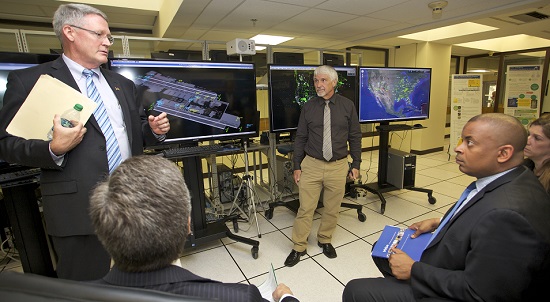
Secretary Foxx visits Volpe’s NextGen Innovation Center, where Director of Air Traffic Systems and Operations Steven Lang (at left) and Chief of Air Traffic Management Systems James Hill (at right) present Volpe’s work on FAA’s NextGen program and unmanned aircraft systems for the U.S. Air Force.
Financing Our Transportation Future
Secretary Foxx’s visit (watch video highlights) came as Congress continued to debate a new multiyear surface transportation funding bill, less than two weeks before federal road construction projects faced shut down.
“There are concepts you all are dreaming up right now that are light years away from being actualized because we have this view of our transportation system that is relatively static,” Secretary Foxx said. “You know as well as I do that transportation isn’t static—it’s dynamic, it’s changing. Technology is coming at us in lots of different ways. The question for us as an agency is, are we ready to tackle that which needs to be tackled for America to maintain its status as the finest transportation system the world has ever known?”
The framework for the discussion around funding critical transportation projects that will maintain and repair America’s bridges and roads has been set, in large part, by the broad strokes outlined in Beyond Traffic, the Secretary’s 30-year vision report on America’s transportation future. Volpe staff with experience in long-range transportation planning worked closely with the Secretary’s office to develop the concepts that appear in Beyond Traffic.
“The work that Volpe has done—to crystallize not only for me and our agency but for our entire country, and frankly the world, the kinds of transportation challenges facing us in the next 30 years through Beyond Traffic—has been outstanding,” Secretary Foxx said. “[Beyond Traffic] is helping us begin a conversation that I think is undergirding a little of why Congress is now taking the surface transportation bill a little more seriously.”
Video highlights from Secretary Foxx’s visit to Volpe.
Exploring Volpe’s Capabilities
After a question and answer session that touched on connected vehicles, the shared economy, and mobility for disabled Americans, Volpe Director Robert Johns took Secretary Foxx on a tour of Volpe’s campus and provided a snapshot of key work.
During his tour, Secretary Foxx met with the Volpe team that worked on Beyond Traffic. He met technical staff focused on advanced-technology crash avoidance systems, and staff advancing research on smart cities—which integrate connected transportation technologies into the emerging infrastructure of the Internet of Things and hold untold potential to empower American mobility.
The Secretary met staff supporting forward-looking, mission-critical work on the Federal Aviation Administration’s Next Generation Air Transportation System and unmanned aircraft systems for the U.S. Air Force.
Secretary Foxx also connected with staff who developed and deploy the vessel tracking system that governments around the world use to enhance maritime situational awareness—and he visited with roughly a dozen African military officials who were at Volpe for a weeks-long training on that vessel tracking system.
Finally, the Secretary met staff working on human factors research based on Volpe’s air, train, and car simulators.
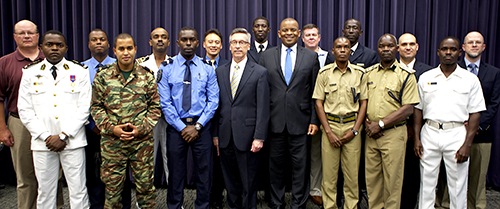
Secretary Foxx met with African military and law enforcement officials from Tanzania, Cabo Verde, Senegal, Kenya, Ghana, and Cameroon, who were visiting Volpe for our annual Maritime Domain Awareness workshop.
Tackling Challenges with Innovation
In his presentation, Secretary Foxx acknowledged that the transportation sector has major challenges to overcome. But, he remained confident that with innovation from government agencies like Volpe and from the private sector, American transportation systems at the federal, state, and local levels will progress toward providing unfettered opportunities for all.
“As we work together, as we listen to each other, as we try to think about the problems that we face in transportation using our best information and the best aspirations of the people we serve, we can move the dial,” he said.
